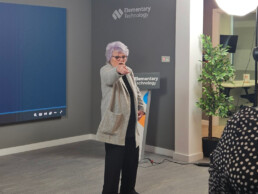School Speak Oracy
I was sent a link to an ongoing discussion on Twitter about the ethics of teaching children who do not speak in Standard English to do so. There are clearly many people who feel great sensitivity around this area – and that is totally understandable.
One of the schools I work most closely with is in an area of massive deprivation, with almost the entire pupil body speaking either in strong Yorkshire accents or with cultural ones. Their teachers and support staff, most of whom also speak with regional accents (although less than half the teachers are from Yorkshire, while all the support staff are from the locality of the school) have embraced the necessities of children learning to speak in the standardised form of English. They have long used my maxim: ‘If a child can’t say it, a child can’t write it,’ and this is now modified to:
‘If a child can’t say it in Standard English, a child can’t write it in Standard English.’
Children must learn to speak confidently and articulately in Standard English if they are to think in the standard form and therefore write, proof and edit in it, but this does NOT mean that they can no longer enjoy and celebrate their own local accent.
The risk of offence or humiliation for children in learning Standard English is not the ‘what’ but the ‘how’. By including the standardised form of English as one of the ‘codes of speech’ pupils will hear around them in their lives – whether in shops, in restaurants, on streets, on transport, on television or on other media – and teaching children to respect all these forms of speech, the stigmas are removed and the elitism is eradicated. We then teach them to switch easily between forms (this is called code switching) whilst having fun – often through role play and performance – and with practice this becomes a smooth transition from their own home accent into other forms of their choice for purpose, but always including models that are entirely in Standard English.
Sadly, some in the profession have not yet understood that Standard English may still be spoken with a regional accent – it purely means that all grammar and pronunciation will be accurate. Where alternative grammatical and vocabulary forms exist that are not in the accepted standard form, speech becomes a dialect (again, a wonderful thing to be celebrated. I love Yorkshire dialects).
Included in the children’s increased repertoire of readily-available forms of speech, however, will also be ‘received pronunciation’ – or the accent of many of the highly educated or the wealthy – formerly known as ‘BBC English’. This is treated purely as another code of speech in their repertoire, and children will use it in role play, drama and presentations in the same way as they will use other codes. We have renamed this code ‘School Speak’ in our oracy programme, and encourage schools to modify that to the name of the school (for example, Roundwood Speak) if they so choose.
Thus, we make ‘School Speak’ an inclusive form that every child and adult in the school will use when asked – whether as the sustained form of speech for all throughout one or more entire lessons a day, or for specific purposes such as a debate, a performance (for example, of poetry) or as a particular character in role play. ALL children sharing the same speech form for the same purposes at the same time… equality with mutual respect – and then all children reverting to the daily speech code of their choice… again, equality with mutual respect!
I have just enjoyed writing a short book for publication as a PDF to help schools to launch and support development of powerful oratory in their schools with dignity. This very affordable book will include resources to support teachers and pupils in developing their exciting and highly entertaining orations for school gatherings and celebrations. More information will be available on our website soon.
Through this means of embedding School Speak in fun and dramatic performances, children will find, as time progresses, that switching from their daily voice, local accent or ‘street talk’ into an impressive form of oratory when appropriate, to be a natural and rewarding experience that will support them in their life as they represent their class, their school and their family, as they attend interviews and as they interact with people of other speech forms in the wider world.
There is no shame in this achievement – only joy and celebration of choice and flexibility. Where else will children develop this empowering and life-changing skill? The clue is in the name – ‘teachers’. We are the teachers, we should empower and enable without being made to feel shame or derision.
Only a week or so ago, a secondary teacher tweeted explaining how he modelled speaking in modified standard English, using sophisticated features and in expressive tones of respect and oration when speaking to all his students in school, and how so many were beginning to reply in a similar vein, modifying their local ‘street talk’ without the need for judgmental comment or potentially humiliating teaching. I wonder, sometimes, whether all our secondary colleagues – who we value so highly – are aware of how hard we work to prepare our pupils for secondary education?
We TEACH them…
…and so often a challenging aspect of learning in one phase of education later becomes a revisit – reawakening memories that are deep seated in the sub-conscious and enabling them to be refreshed, extended and invigorated with the maturity of the years and giving the impression of an ease of learning that belies the hard work of the previous phases.
Never feel shame about teaching children something that could potentially enrich and reform their life opportunities, for we all know that TEACHERS MAKE THE DIFFERENCE.
Talk:Write
A fun and flexible approach to improving children’s vocabulary, speech, and writing.


